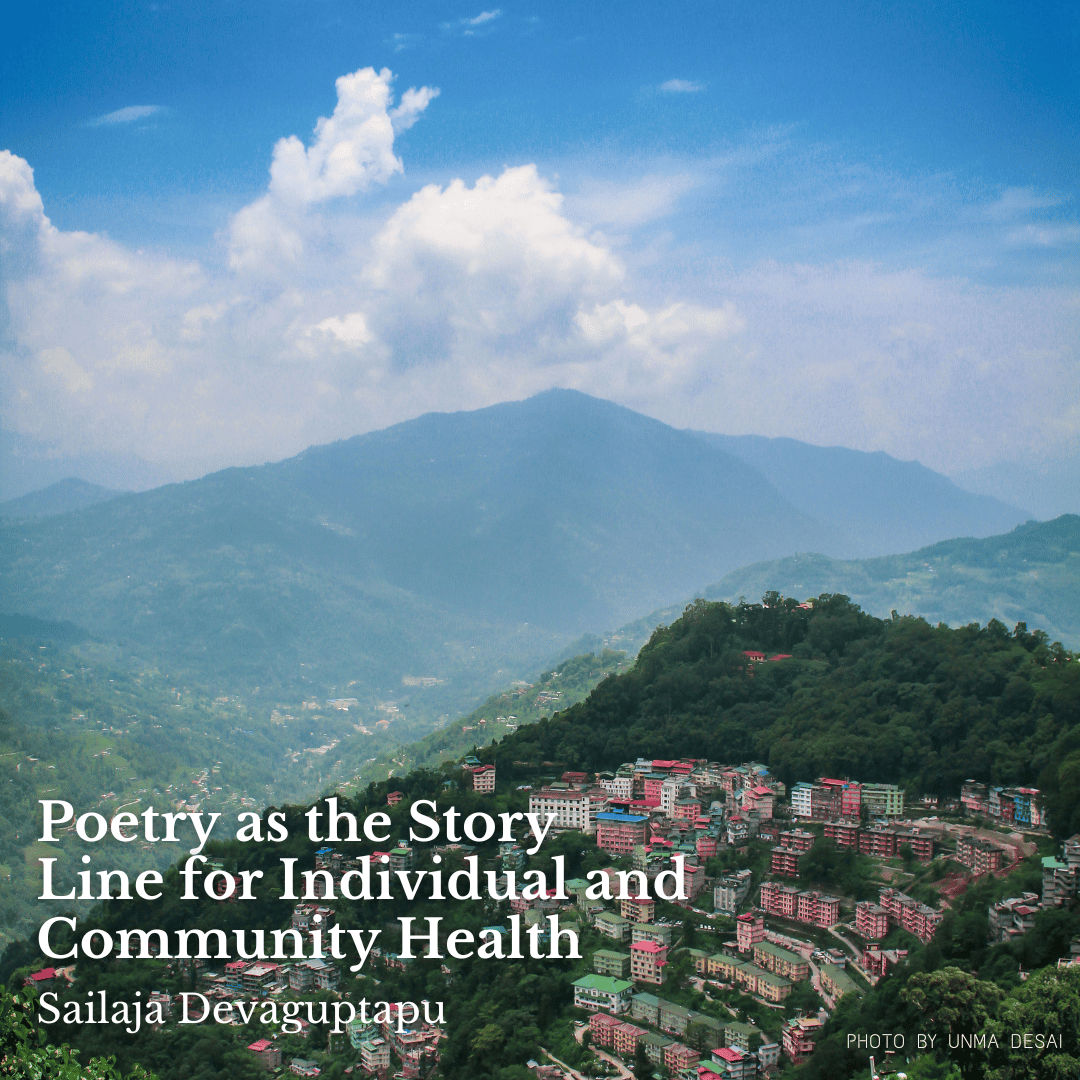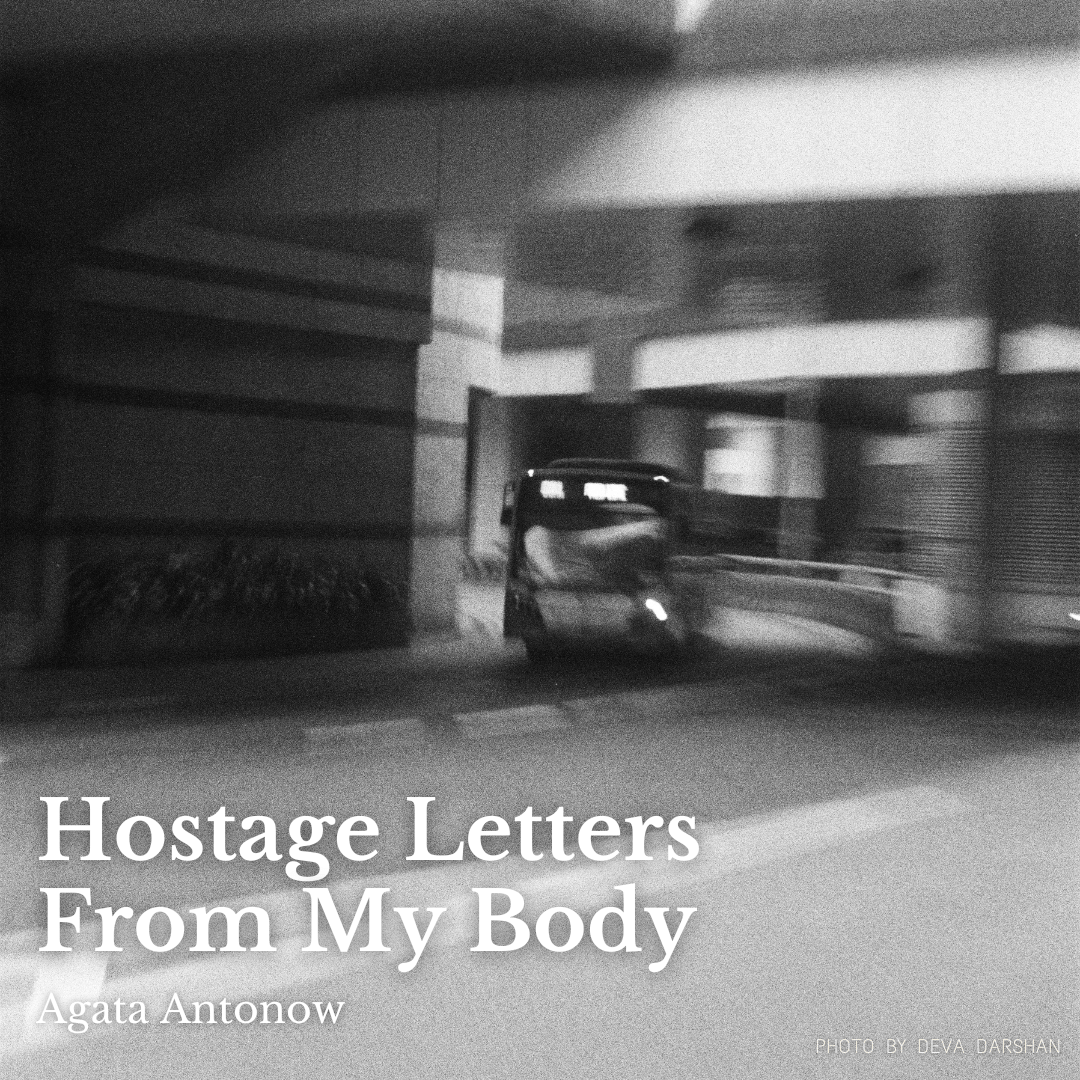In February of 2023, we released our third Open Call: How might we reflect and reimagine wellness in public health as art, letters, stories and poetry? The following is a poetry submission we received from this open call.
“The submission deals with intervention of poetry for health and wellbeing based on experience and evidence. It brings to light the issues surfaced and voiced by healthcare providers such as moral crises, emotional turmoil, and health equity to help gain deeper perspective towards possible ways of addressing them creatively through poetry, with an integrative and holistic approach. Poetry is associated with mental and spiritual health. It could be an effective medium for collective and individual catharsis by enabling to identify and become aware of our emotions, process the unresolved emotions and express them creatively. It was prevalent in several cultures as a shared community practice. Thus, it can be used for community gathering towards collective reflection and action on healthcare initiatives including healthcare emergencies towards sensitization, awareness-raising and educating the public.”
Sailaja Devaguptapu
Poetry as the Story Line for Individual and Community Health
Poetry: A Journey Within and Without
Thanks to Covid – 19 pandemic. One of the phases of my life during which I realised and pursued poetry with multiplied zeal, faith and impact. My conviction that it is much more than a form of entertainment was reinforced. It was a way of connecting, communing, healing, being, becoming, transcending, and transforming. It was a movement and activism in its own right and dignity. A means to share stories, find oneself in others’ narratives, know about others wellbeing, and offer empathy unravelling and weaving the tapestry of a shared storyline.
I was working as a Senior Research Officer at a Centre for Wellness when the pandemic struck. Till then, I used poetry as a spiritual anchor for self-reflection and inspiring fellow beings. During the period of lockdown and mandatory quarantine, it became an adaptive strategy to turn my confinement into enriching solitude. It was a highly effective enabling mechanism to remain mentally occupied, constructively. It gradually evolved into a meaning making activity and vocation to keep my students emotionally engaged and foster high quality connections. Most of them belonging to the healthcare sector closely witnessed the dynamics of healthcare systems and surmounting stress in the healthcare community. As their chosen listener, it was natural for me to experience secondary trauma while learning about the plight of their life, overwhelming challenges, lack of fulfilment and helplessness in the face of uncontrollable events. One would share about having to navigate through the unethical practices in the healthcare sector, another about their frustration regarding non-availability of hospital beds or oxygen cylinders, several about losing their dear family member, patients etc. On one side, I’d be grateful and humbled for their trust in me. On the other side, it added to my grief of living seemingly a never ending nightmare. Daily reflections were no longer a choice but became a necessity!
I’d write poems to share and alleviate trauma, trigger individual and collective reflections and inspire action. Emerging from a poet to a listener poet, the landscape of my poems too alternated between generic and customised poems reflecting their feelings. The themes diversified – death, loneliness, hopelessness, trauma, abuse, self harm, unemployment, work life imbalance, strained interpersonal relationships, moral and ethical dilemmas, identity crisis, and so on. I’d share the poems with my students and few faculty members. As several found themselves and their stories in the poems penned for someone else, it helped embrace vulnerability and de-stigmatize mental health. It allowed more people in need of mental health support to connect proactively and seek help. Further, it motivated to explore, learn and appreciate poetry as a possible intervention to reflect and assuage stress, burnout and emotional exhaustion. Enabling to serve a common cause, it gave an opportunity to unlearn and realise that slow could be fast as we paused and reflected. It underscored that while suffering may be common, learning is a choice and process. Several times, the impact made as a poet was far greater than as a researcher as gradually strangers would reach out to share about some of the poems resonating with them and feeling at home. It was a revelatory journey of self discovery and healing from lonesomeness to wholesomeness. An opportunity for each one of us to fathom and let manifest the soul’s signature, unique and universal at the same time!
Inspiration Driven Action
The ensuing experiences would provoke deeper thoughts paving path to conscious energy transmutation. One of the outcomes was designing and delivering an elective credit course – Health Humanities. It was to intensify the work towards alleviation of mental health for self-care, as caregivers and stakeholders of public health. One of the objectives was to enable the students to have firsthand experience of application of art for emotional wellbeing. They would paint away their lives on canvas, connect and offer connection through music and dance, practice reflective photography or pen a poem to navigate and harmonise the external chaos by tuning into the harmonics within! The process of uncovering and identifying same thoughts and feelings in diverse expressions underscored the possibility of coherence manifesting as incoherence, the shift from incongruence to congruence and confluence. Hence, the organic evolution towards acceptance, owning, building and blending of perspectives in general and as healthcare professionals. It reinforced the words of famous mystic and poet Rumi, “Your task is not to seek for love, but merely to seek and find all the barriers within yourself that you have built against it.”
The willing musings would generate collective energy to enkindle and remain in a state of flow. Beholding the silent promise to facilitate and partake in the dawning of an awakened era, we could embark on the journey from chaos to cosmos through new creations. The imposed physical distance serving as a bridge to strengthen bonds and deepen connections, quarantine time nurturing solitude, artworks evincing my co-creators universal self, helplessness contrasting with selflessness seemed to be revisiting paradoxes, the literary devices in poetry. How to decipher the nature’s poetry but to become one with it!
One of the poems penned during the introspective moments was “Who are we?” (1)
Who are we?
Are we the tissues and the bones
Traversing amidst the knowns and the unknowns?
Are we the forms and our names
Amidst the land claims and the mind games?
The wanderers are we in the no man’s land?
Or, the victims stuck in the quick sand?
Are we the seekers of the truth
The co-seekers thirst too to soothe?
You and me
From the void hail, do we?
Ambrosia for else broods the bee
As thine shade, the tree
Being without being, the river merging with the sea
The bygones and hereafters, letting be
Unto thine calling verse, the song bird sets thyself free
The welkin and the billows whilst the marvels oversee
You and me
Who are we?
Sailaja Devaguptapu
Such poems typically received a reflective response in the form of creative art works. They would fuel our imagination to reimagine wellbeing considering their application from a preventive healthcare perspective. Eventually, they led to further reflection and exploration of the relevance of graphic medicine, narrative medicine, poetic medicine etc. to both personal wellbeing and public health.
Poetry for Individual and Community Health
Poetry has the ability to combat loneliness, a growing public health problem (2). At times, concerns seeming personal may represent common challenge faced by a community. Attempts to assuage such challenges could serve a bigger cause. For e.g., hosting listener poet sessions for healthcare community can help reduce stress and burnout. Though such sessions are personalised, the concerns surfaced and voiced by the speakers such as guilt, moral crises, emotional turmoil, health disparities may allow us to gain a deeper perspective to be able to address them better with an integrative approach and provide holistic care. The poem “Kunal’s Kavita” reflects the emotional distress undergone at the loss of a loved one.
Origin Story
Kunal got married to Kavita. It was their dream to share the mutual love they had for each other for the rest of their lives. The word ‘Kavita’ means a poem. Both were doctors. He lost her to Covid – 19. The once emergency medical officer’s inability to save his wife in emergency despite doing everything he could have done frustrated him. He is haunted by the guilt of agreeing to travel on Kavita’s request as she was diagnosed with Covid-19 on their return. Costing them their togetherness, it turned out to be her last wish! Their last journey together led to their first journey apart!
He had been trying to cope up with the grief ever since. He is on his quest for soul searching and meaning making. He lived it all; from depression to contemplating self-harm having lost his beloved. He resisted as she wouldn’t like him killing himself.
He wrote his first poem, “A Hope” after her physical departure beginning his life’s journey with Kavita!
Kunal’s Kavita
I loved her
I lost her
I lost her yet I won
For, we were, we are, and we will forever remain one
Can tear us apart none;
As we move along in the life’s run
I’d find her in many, yet none like her
Unto each, we were the beloved and the lover
The bee longing for thine flower
She, my caregiver!
How do I say what she was to me?
For not merely eyes it takes a heart to see
Her soul in me
Me, now a flower bereaved of the bee
Yet, forever in me
Would bloom she
For, I died with her……anew I am born
Doth rose not hold the thorn?
I died to let her live on
Long after I am gone
Unto pain, now, a witness I bear
I live on, her love to share
Together, unto each, a home we were
When life turned a nightmare
As I see her here, there, and everywhere
To quit, I yet not dare
For, I know she’s watching and wouldn’t like it
Ergo, my path, I let with her memories be lit
I am hurt, yet, for each we were made
Unto my former self, a goodbye as I bade!
~ Listener Poet Sailaja Devaguptapu
(Note: The narrative and poem are shared with consent)
Kunal penning a poem in a state of bereavement was to me a courageous act of being vulnerable and embracing his vulnerability. It bespeaks the role of poetry for self-reflection and processing trauma. It isn’t uncommon for healthcare workers to navigate through emotionally charged situations and yet having to be strong and remain composed at the workplace. Having someone to listen and empathise could provide relief to process and release these emotions. Verbalization can have a cathartic effect and reflective listening could be therapeutic (3-5). Personalised poetry facilitates connection. Feeling connected has the potential to improve mental health as humans are wired to connect (6-7).
Caring for caregivers can have a ripple effect on the lives they touch. Depicting their stories of silent struggles through an expressive art such as poetry and sharing with public can aid as a trust building measure to restore eroding faith in the overall quality of caregiving and healthcare systems. As a public art, it has a potential to make profound positive impact by appealing to the popular psyche. It can be useful to create awareness, sensitize and mobilize the public to be active stakeholders and adopt a proactive healthcare approach such as timely vaccination, maintaining hygiene, following preventive measures etc.
Public health literacy may be undertaken using poetry through creative expression of health initiatives. It enables to provide a stimulating environment to provoke collective thought and action to execute them. Poetic activism may be employed to promote health and wellbeing. Further, field visits of healthcare professionals can be captured as data poems and ethnographic poetry towards a dynamic and creative human endeavour.
Poetry: An Intersection of Science, Art, Spirituality and Healing
“Poetry is a natural medicine; it is like a homeopathic tincture derived from the stuff of life itself – your experience,” writes John Fox, practitioner of poetic medicine and the founder of The Institute for Poetic Medicine. His works help gain insights on poem making as a healing art and writing as a spiritual practice (8).
Poetry is associated with mental and spiritual health. Reading, writing, reflecting and listening to poetry can help improve one’s wellbeing (9-12). It was prevalent in several cultures as a shared community practice. Persian, Arabic, Turkish, Indian to name a few. Samā, the practice popular among Sufis involves gatherings centered in poetry. Philosophically and spiritually, they were believed to have multiple benefits such as upkeep and improvement of the social and moral fabric of individual and collective life. Stimulating the intellect, they help connect hearts and transcend the mind. This enables to evolve from thinking to feeling, fostering brotherhood. Rhyme and meter can lead to more positively felt and perceived emotions and enhanced aesthetic appreciation (13). Poetry is capable of profound emotional engagement by engaging the brain areas of primary reward. It represents a cross-cultural communication and expressive repertoire (14).
The ever increasing need for application of poetry as a coping strategy, an intervention to facilitate meaning making and help adapt to challenging situations by translating, reframing and releasing trauma is evident. Poetry writing when practised with a reflective approach has several benefits. It helps in recognising one’s feeling, thoughts and emotions. It is no longer merely a linear process of describing, interpreting, and evaluating an experience and planning action but an organic process of learning about oneself which could lead to healthy and tangible outcomes. They include awareness, acknowledgment and acceptance of one’s experience as an opportunity to revalue, reprioritize and reorient oneself based on the relevance of one’s role in co-evolving contexts. Being progressive, the approach is immensely useful for self-care particularly when faced with an emotional crisis. It may also improve the quality of caregiving by enhancing empathy (15). Hence, poetry intervention as a public health initiative can be beneficial in general and for mental health in particular (16).
References
1. Devaguptapu, S. (2022). “Factoring the Human into Health,” Survive & Thrive: A Journal for Medical: Humanities and Narrative as Medicine: Vol. 7: Iss. 1, https://repository.stcloudstate.edu/survive_thrive/vol7/iss1/11
2. Xiang, D. H., & Yi, A. M. (2020). A Look Back and a Path Forward: Poetry’s Healing Power during the Pandemic. The Journal of medical humanities, 41(4), 603–608. https://doi.org/10.1007/s10912-020-09657-z
3. Marx, C., Benecke, C., & Gumz, A. (2017). Talking Cure Models: A Framework of Analysis. Frontiers in psychology, 8, 1589. https://doi.org/10.3389/fpsyg.2017.01589
4. Carroll R. (2005). Finding the Words to Say It: The Healing Power of Poetry. Evidence-based complementary and alternative medicine : eCAM, 2(2), 161–172. https://doi.org/10.1093/ecam/neh096
5. Jones, A. C., & Cutcliffe, J. R. (2009). Listening as a method of addressing psychological distress. Journal of nursing management, 17(3), 352–358. https://doi.org/10.1111/j.1365-2834.2009.00998.x
6. Martino, J., Pegg, J., & Frates, E. P. (2015). The Connection Prescription: Using the Power of Social Interactions and the Deep Desire for Connectedness to Empower Health and Wellness. American journal of lifestyle medicine, 11(6), 466–475. https://doi.org/10.1177/1559827615608788
7. Dutton, J.E. and Heaphy, E.D. (2003) The Power of High-Quality Connections. In: Cameron, K. and Dutton, J., Eds., Positive Organizational Scholarship: Foundations of a New Discipline, Berrett-Koehler Publishers, 262-278
8. Fox, J. (1997).Poetic Medicine: The Healing Art of Poem-Making. New York, N.Y.: Jeremy P. Tarcher/Putnam
9. Zhang W. (2022). Psychological healing function of poetry appreciation based on educational psychology and aesthetic analysis. Frontiers in psychology, 13, 950426. https://doi.org/10.3389/fpsyg.2022.950426
10. Tegnér, I., Fox, J.R., Philipp, R., & Thorne, P. (2009). Evaluating the use of poetry to improve well-being and emotional resilience in cancer patients. Journal of Poetry Therapy, 22, 121 – 131.
11. Wilkes, J., & Scott, S. K. (2016). Poetry and Neuroscience: An Interdisciplinary Conversation. Configurations, 24(3), 331–350. https://doi.org/10.1353/con.2016.0021
12. Leedy J, editor. (1995). Poetry as Healer: Mending the Troubled Mind. New York, N.Y.: The Vanguard Press
13. Obermeier, C., Menninghaus, W., von Koppenfels, M., Raettig, T., Schmidt-Kassow, M., Otterbein, S., & Kotz, S. A. (2013). Aesthetic and emotional effects of meter and rhyme in poetry. Frontiers in psychology, 4, 10. https://doi.org/10.3389/fpsyg.2013.00010
14. Wassiliwizky, E., Koelsch, S., Wagner, V., Jacobsen, T., & Menninghaus, W. (2017). The emotional power of poetry: neural circuitry, psychophysiology and compositional principles. Social cognitive and affective neuroscience, 12(8), 1229–1240. https://doi.org/10.1093/scan/nsx069
15. Joshi, Anuradha & Paralikar, Swapnil & Kataria, Shreya & Kalra, Juhi & Harkunni, Sheetal & Singh, Tejinder. (2022). Poetry in medicine: a pedagogical tool to foster empathy among medical students and health care professionals. Journal of Poetry Therapy. 35. 1-13. 10.1080/08893675.2022.2043119
16. Delamerced, A., Panicker, C., Monteiro, K., & Chung, E. Y. (2021). Effects of a Poetry Intervention on Emotional Wellbeing in Hospitalized Pediatric Patients. Hospital pediatrics, 11(3), 263–269. https://doi.org/10.1542/hpeds.2020-002535
Follow Us On Social Media!
Instagram: @light4ph
Twitter: @light4ph
Facebook: @LIGHT – Leaders Igniting Generational Healing and Transformation
Youtube: @light4ph



